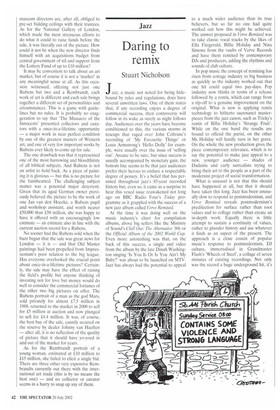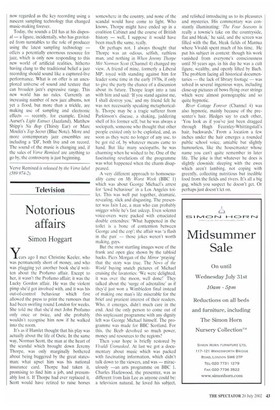Daring to
remix
Stuart Nicholson
Jazz, a music not noted for being hidebound by rules and regulations, does have several unwritten laws. One of them states that, if any recording enjoys a degree of commercial success, then controversy will follow in its wake as surely as night follows day. Audiences over the years have become conditioned to this, the various storms in teacups that raged over John Coltrane's recording of 'My Favourite Things' or Louis Armstrong's 'Hello Dolly' for example, were usually over the issue of 'selling out'. Arcane to be sure, but since success is usually accompanied by monetary gain, the bottom line seems to be that jazz audiences prefer their heroes to endure a respectable degree of penury. It's a belief that has persisted throughout jazz's 85-year recorded history but, even so, it came as a surprise to hear this vexed issue reawakened not long ago on BBC Radio Four's Today programme as it grappled with the success of a new jazz album called Verve Remixed.
At the time it was doing well on the music industry's chart for compilation albums, above big sellers like the Ministry of Sound's Chill Out: The Alternative '80s or the Official Album of the 2002 World Cup. Even more astonishing was that, on the back of this success, a single and video from the album by the late Dinah Washington singing 'Is You Is Or Is You Ain't My Baby?' was about to be launched on MTV. Jazz has always had the potential to appeal to a much wider audience than its true believers, but so far no one had quite worked out how this might be achieved. The answer proposed in Verve Remixed was to take classic vocal tracks by the likes of Ella Fitzgerald, Billie Holiday and Nina Simone from the vaults of Verve Records and have them remixed by contemporary DJs and producers, adding the rhythms and sounds of club culture.
In pop music the concept of remixing has risen from cottage industry to big business as quickly as the industry worked out that one hit could equal two pay-days. Pop industry now thinks in terms of a release followed by a remix, which can range from a rip-off to a genuine improvement on the original. What is new is applying remix technology to hitherto sacrosanct masterpieces from the jazz canon, such as Trickys remix of Billie Holiday's 'Strange Fruit'. While on the one hand the results are bound to offend the purist, on the other Ms Holiday will hardly turn in her grave. On the whole the new production gives the piece contemporary relevance, which is to say the potential to make jazz appeal to a new, younger audience — shades of Dadaists and early surrealists trying to bring their art to the people as a part of the modernist project of social transformation.
What is unusual is not that this should have happened at all, but that it should have taken this long. Jazz has been unusually slow to respond to postmodernism, and Verve Remixed reveals postmodernism's predilection for surface rather than root values and to collage rather than create an in-depth work. Equally there is little attempt to sustain a continuity of values, rather to plunder history and use whatever it finds as an aspect of the present. The approach is a close cousin of popular music's response to postmodernism, DJ culture, immortalised in Grandmaster Flash's 'Wheels of Steel', a collage of seven minutes of existing recordings. Not only was the record a huge underground hit, it's now regarded as the key recording using a nascent sampling technology that changed music-making forever.
Today, the sounds a DJ has at his disposal — a figure, incidentally, who has gravitated from turntables to the role of producer using the latest sampling technology — offers a potentially enormous resource for jazz, which is only now responding to this new world of artificial realities, hitherto having clung to the traditional belief a jazz recording should sound like a captured-live performance. What is on offer is an unexplored universe of sound and texture that can broaden jazz's expressive range. This new world has no rules. Currently an increasing number of new jazz albums, not yet a flood, but more than a trickle, are making use of sampling and electronic effects — recently, for example, Eivind Aarset's Light Extract (Jazzland), Matthew Shipp's Nu Bop (Thirsty Ear) or Marc Moulin's Top Secret (Blue Note). More and more contemporary jazz ensembles are including a 'DJ', both live and on record. The sound of the music is changing and, if the sales of Verve Remixed are anything to go by, the controversy is just beginning.
Verve Remixed is released by the Verve label (589 974-2).



























































 Previous page
Previous page